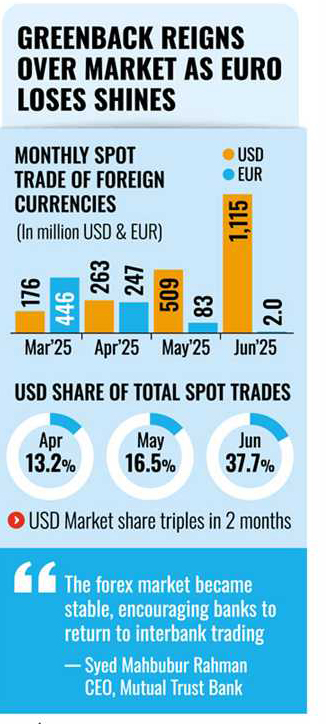Lifting crawling-peg controls changes forex dynamism
Currency traders turn back to dollar for fresh bucks

Published :
Updated :

Interbank traders now turn their sights back on the US dollar under free-float exchange regime, making interbank foreign-exchange transactions vibrant to a great extent.
Even few months ago, the commercial banks showed more interest in purchasing the Euro instead of the American greenback to avert exchange-rate shocks stemming from heavily controlled crawling-peg regime.
But things started reversing for the last couple of months after the central bank revised the crawling-peg system into a more flexible exchange-rate regime that allows the lenders to quote freely for sourcing the dollar.
According to statistics collated from market players, banks made outright transactions of dollars amounting to $175.73 million on the spot market in March while the volume of Euro they traded was €446.23 million.

Thereafter, the dollar saw a turnaround to dominate the country's forex market again with the volume rising to $262.69 million, $508.89 million and $1115.41 million (over $1.1 billion) in April, May and June respectively.
On the other hand, the outright trades in the Euro on the forex spot market dropped remarkably to a record €247.00 million, €82.72 million and €2.10 million in the respective three months.
Seeking anonymity, a Bangladesh Bank official said the forex trade by the banks on the spot market kept vibrating since May last when the central bank introduced free float of the currencies under guardrails of an undisclosed band.
The official said daily average spot transaction in June 2025 rose substantially to $68.7 million, in a leap from around $7.5 million in March and April of 2025.
The share of spot transactions increased to 37.7 per cent in June from 13.2 per cent in April and 16.5 per cent in May, the central banker said.
Managing director of Shahjalal Islami Bank Mosleh Uddin Ahmed says as the banking regulator launched market-centric exchange regime in mid-May, there is no unofficial cap on exchange rate.
"Now the banks can freely quote price of the US dollar, which prompted the commercial banks to go for more bagging of the greenback, which is a good sign for the industry," he says.
During the pre-floating exchange-rate regime, the seasoned banker mentions, banks had been observed bypassing the spot market and largely trading their precious dollars through byways like interbank swaps and cross-currency transactions, especially dollar-euro transactions, where the then crawling-peg-determined exchange rate was not applicable.
"Now, spot market
becomes lucrative for the traders. That's why the outright transactions of the US dollar continue to rise," he says.
Managing director and chief executive officer of Mutual Trust Bank Syed Mahbubur Rahman explains that a hide-and-seek type of tendency was observed in the pre-floating exchange regime as banks largely ducked interbank spot market with more focus paid on cross-currency options.
"After exchange rate was left to the market to determine," the veteran banker says, "the forex market became stable, which encourages the commercial bankers to participate more in the spot market, which the regulator rightly wants."
jubairfe1980@gmail.com


 For all latest news, follow The Financial Express Google News channel.
For all latest news, follow The Financial Express Google News channel.